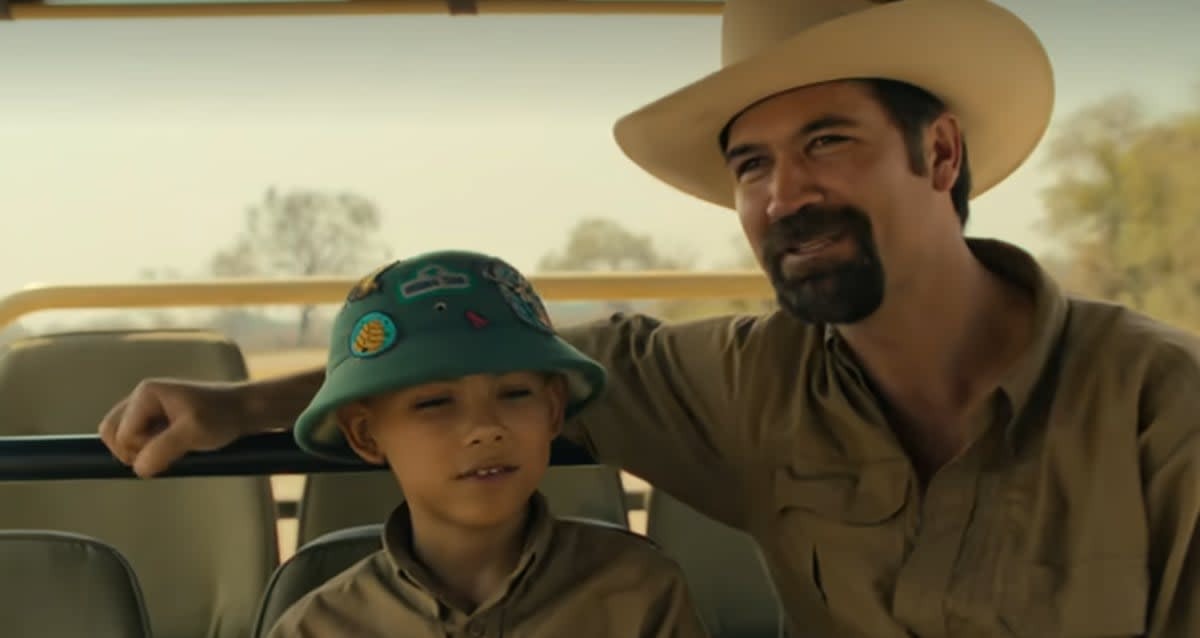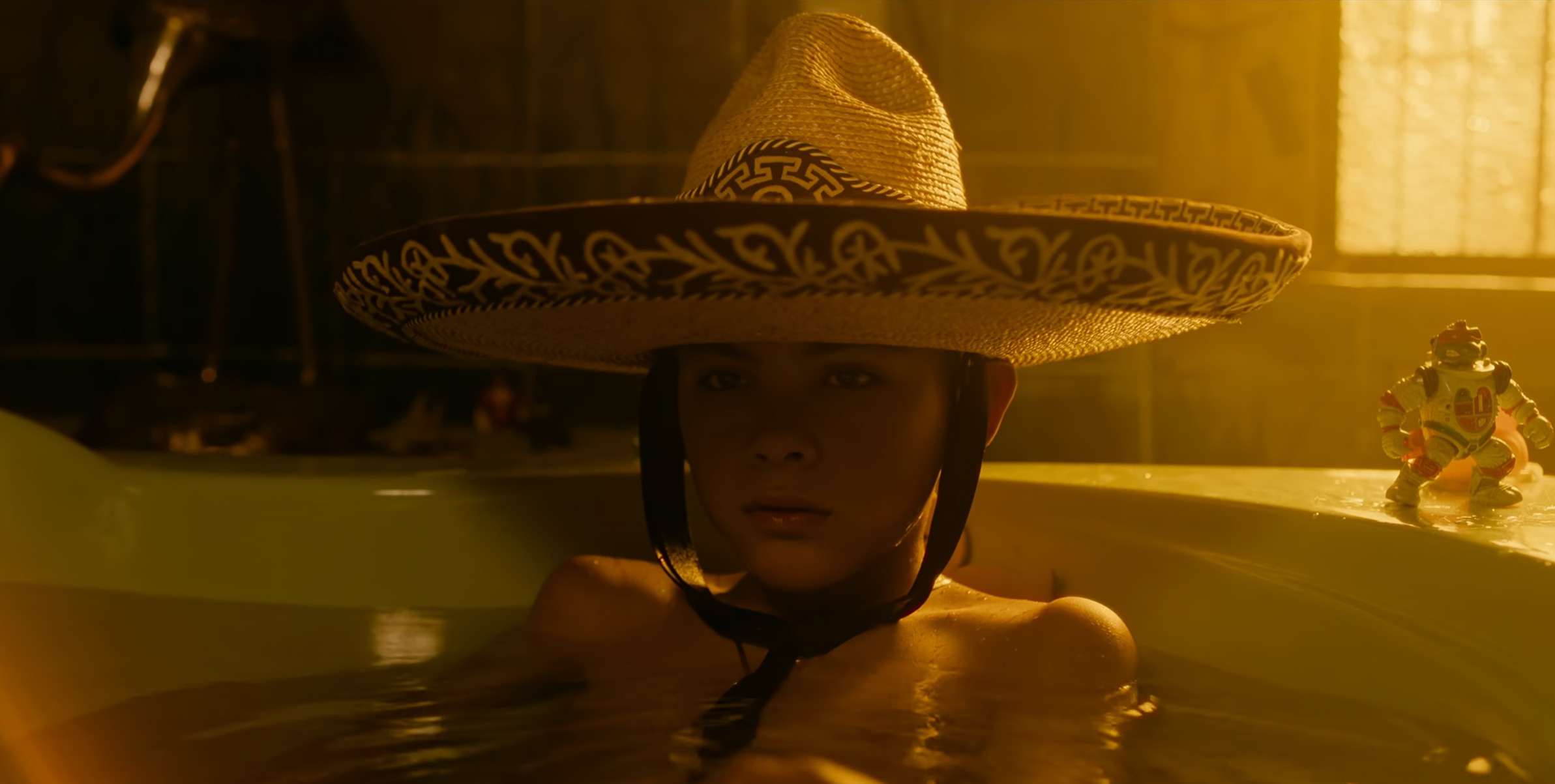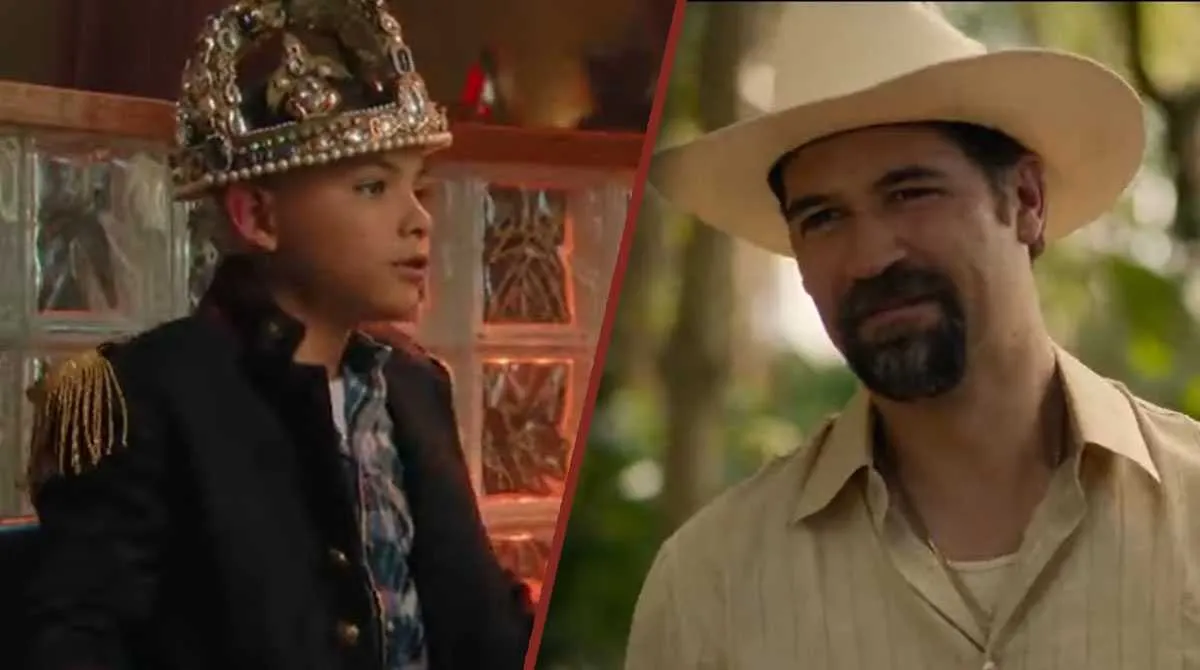Tochtli, a young boy, lives inside a hidden palace in Mexico with his father, Yolcaut, a gangster who built the entire estate for himself. Others living with them include Chichilkuali, Miztli, Itzpapalotl, and Azcatl—all part of Yolcaut’s circle. This palace also doubles as a zoo filled with exotic animals.
The only outsiders allowed are Yolcaut’s girlfriends. Tochtli is homeschooled by Mazatzin and not allowed to go outside, so his view of the world comes from the luxury around him, the lessons Mazatzin teaches, and the movies he watches.

But as he starts to grow and ask questions, it becomes clear that what he believes about life doesn’t always match how things truly work. That confusion begins to affect the relationship between him and Yolcaut. Whether or not they can mend this broken bond becomes a major question as the film moves towards its ending.
What Tochtli Realises While Living Like a Prince in Mexico
Every chapter of Down the Rabbit Hole is marked by the hat Tochtli wears, taken from his big collection of hats, caps, and sombreros. These hats give an idea of the kind of life he’s living. The story in each chapter tends to move without a straight path and keeps drifting, but near the end of each one, things start turning darker.
For example, in the first chapter, Tochtli puts on a tricorne hat on his birthday—a clear sign of the lavish life he’s used to, which keeps getting more extravagant every year. He gets very expensive gifts and seems happy receiving them.
Still, it becomes obvious that his real focus is on owning a pygmy hippopotamus, showing that what he already has doesn’t feel enough. Mazatzin uses the moment to teach him about class struggle through the story of the French Revolution, though Tochtli doesn’t understand it.
Even so, he can’t completely ignore the growing gap between the rich and the poor, especially when the governor comes to Yolcaut for help. But Yolcaut lets his pride get in the way and damages his relationship with the governor.
This part shows that Yolcaut and people like him operate on favours—they work together when it’s convenient, but things fall apart once power begins to change or one side demands too much.
What Tochtli Discovers When He Puts on the Hat of a Detective
Tochtli starts getting suspicious of his father’s actions when he realizes Yolcaut might not be as powerful as he claims. This curiosity leads him, in the second chapter, to wear a deerstalker hat similar to what Sherlock Holmes wore, symbolising his new role as a detective.
He finds out that aside from the people living in the palace, there’s someone else Yolcaut trusts—Paula. She works as his adviser, and although it’s not confirmed, she likely handles connections between Mexico and the U.S., making it easier for Yolcaut to handle his dealings.
As Tochtli digs deeper into his father’s world—dark and dangerous as it is—he stumbles upon an armory and finds a revolver, which becomes his first step towards violence. He later watches Yolcaut bring home a prostitute named Quecholli, which seems to leave a strong impact on him.
Mazatzin, seeing the change in Tochtli, tries to offer him a different perspective and even challenges Yolcaut’s ideas about masculinity. By giving books to Chichilkuali, Mazatzin tries to prove that there’s always room for change.
But these efforts mean little after Tochtli witnesses his father torturing a man. Things get worse when Yolcaut takes Tochtli to Namibia to get the pygmy hippo. That trip disconnects the boy even more from the real world.
What Tochtli Understands While Acting Like an Explorer
Tochtli wears an explorer’s outfit during their trip to Namibia. But as the journey continues, it becomes clear that getting the pygmy hippo is just another way for Yolcaut to show off how wealthy and influential he is. The gangster is forced to face something unexpected when Tochtli pulls out a gun and almost kills a wild dog.
Yolcaut could have used that moment to teach the boy that picking up weapons isn’t the right path and that focusing on education would serve him better. That would have been the responsible thing to do, especially since Yolcaut himself didn’t have access to education.
But instead of correcting Tochtli, he says something vague about getting used to violence early. That whole conversation is pushed aside when the local guide successfully captures some pygmy hippos to be transported to Mexico.
Yolcaut and Tochtli are reminded again of how fragile life is when the animals fall sick and can’t be moved. Rather than explaining the situation to Tochtli, Yolcaut kills the hippos in front of him, ignoring any chance to show him what it means to be empathetic or compassionate.
That violent act leaves a lasting scar. Tochtli quietly starts to realise that his father is not the best person to learn kindness or morality from. Yolcaut either cages beautiful animals or kills them. Even if Tochtli knows deep down that something about it feels wrong, he doesn’t see any other option around him.
What Tochtli Figures Out While Dressed Like a Samurai
Although he’s surrounded by luxury, Tochtli doesn’t feel free to make his own decisions. But at a point, he comes to understand that refusing to obey can also be a form of choice, no matter how young you are. That’s when he puts on the outfit of a samurai and chooses to stop talking to Yolcaut until the man admits his faults.

The fall of Yolcaut’s empire and Quecholli’s death only add to the weight of the moment. Mazatzin tries to support Tochtli by giving him a book about the samurai and expressing genuine care for him. Meanwhile, Yolcaut doesn’t pause for reflection.
Instead, he replaces Quecholli with another woman, Cuazalotl, and acts like nothing has happened. Life begins to return to a kind of routine, but this peace is broken once it’s revealed that Mazatzin has been informing on Yolcaut to the authorities.
He documents the illegal activities inside the palace in full detail, but leaves Tochtli out of it to protect the boy from legal trouble. Eventually, Yolcaut’s downfall is marked by the head of the governor being sent back as a warning.
A full military raid is carried out on the estate, something Tochtli had unknowingly predicted while playing with toy soldiers around a model of the palace. Yolcaut manages to send Tochtli away with Cuazalotl before things get worse, promising to contact him once things settle.
What the Ending Says About Tochtli’s Future
The closing moments of Down the Rabbit Hole hint that the family living near the palace—one of them gave Tochtli a He-Man toy—ended up adopting him. Now, he stays with a white American family, which makes it look like his Mexican background has been completely cut off.
He proudly wears a coonskin cap without knowing the disturbing meanings behind it. Yolcaut, even though he is not physically present, still finds a way to remind his son of where he comes from by sending him taxidermied heads of two pygmy hippos as a birthday present.
This act confirms Yolcaut’s survival and suggests that he is now living in Namibia, since access to those animals wouldn’t be possible otherwise. The ending also shows that Yolcaut is still watching Tochtli from a distance, meaning that the boy’s past hasn’t been completely erased.
Whether staying with white Americans will help Tochtli grow into a balanced adult is uncertain. What’s more worrying is the thought that he might eventually be reunited with Yolcaut, which doesn’t seem like a healthy future. The movie leaves things open, making people wonder about what direction Tochtli’s life will take.
I think the best path would be for him to reconnect with Mazatzin—the only person who ever tried to teach him peace, offer him knowledge, and guide him towards becoming a better human being.



